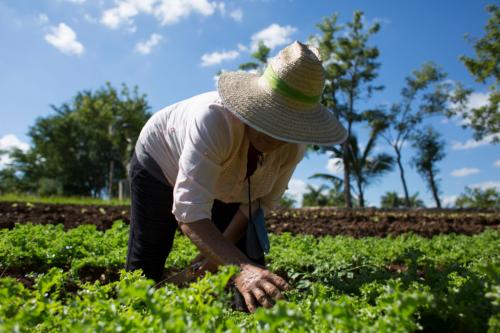"Our historic task is to ensure that no human being goes hungry"
The fight against hunger in the world is a task that falls as much on the shoulders of peasants, as it does on the shoulders of States and Civil Society.
- Opinión

In the context of October 16 – Global Day of Action for Peoples' Food Sovereignty and Against Multinational Corporations, and in the context of the commemoration of 25 years for food sovereignty – we continue to claim food sovereignty as a philosophy of life, and a concrete and legitimate political proposal in the face of the food, social and environmental crisis that the world is going through. Our historic task is to guarantee that no human being suffers from hunger: as we affirmed as a movement in our recent official declaration of La Via Campesina "Food Sovereignty, a manifesto for the future of our planet".
The recent report by the Food and Agriculture Organization of the United Nations (FAO) titled "The State of Food Security and Nutrition in the World in 2021" states that in 2020, nearly one in three people in the world (2.37 billion) did not have access to adequate food. The report also mentions that 12% of the world's population, or 928 million people, were severely food insecure in the year of the pandemic, 148 million more than in 2019.
The fight against hunger in the world is a task that falls as much on the shoulders of peasants, as it does on the shoulders of States and Civil Society. Hunger is not only related to the lack of food, but also to the concentration and unequal distribution of wealth. It is linked to supply problems and to a system of subsidized prices for industrial food that has serious social and environmental repercussions. The industrial food model, agribusiness and neo-liberal policies, which are based on the exploitation of workers and natural resources, generate severe social problems such as poverty, hunger, unemployment, criminalization, migration and violence in many countries. The industrial food model is clearly inefficient and unsustainable, dominated by a handful of transnational corporations that see food as a commodity to be speculated on and as an endless source of profit.
As a peasant movement, we have the responsibility to produce food, but we know that it is not enough just to have food; we must also guarantee healthy and poison-free food that guarantees the health and life of humanity and nature. To generate equitable relations between producers, consumers and the environment. We need clear public policies and the enforcement of the rights of those who cultivate and feed the population, rights that are now recognized by the United Nations Declaration on the Rights of Peasants. Indeed, it is only possible to achieve food sovereignty through agrarian reform, without criminalizing struggles and with land distributed to people living off the waters, fields and forests.
As we denounced at the United Nations summit on food systems, food is not a playground, but a stake in many power relationships. Food is about the possible and sustainable future of humanity. This is why we must be attentive and ready to mobilize. More than ever, States must invest so that the rural world is ever more alive, with peasant men and women who can feed the populations and that they are not at the service of food globalization, multinationals and the world market. Food sovereignty fights for life, for the protection of territories and the people who live in them, through solidarity, social and environmental justice.
As we have already pointed out, food is a fundamental human right that, in addition to guaranteeing health, demands adequate nutrition and a dignified life for people. Building diversified, just and sustainable food systems based on food sovereignty and agroecological production is essential for the present and future of humanity. It is impossible to turn back the clock on such fundamental rights as food, in the midst of the crises we are currently experiencing.
This October 16, we denounce the networks of private interests that endanger the sovereignty and food security of people around the world.
Food is not a game and covid-19 has forced more than 120 million people to be on the chronic hunger lists. Peasantry, in alliance with rural, forest, water and urban organizations, has real solutions based on food sovereignty as a fertile ground for social, environmental and political transformations.
Food sovereignty means land, water, seeds, bread and solidarity!
Harare, October 15 2021
Del mismo autor
- Souveraineté alimentaire pour la justice climatique maintenant! 29/10/2021
- Food Sovereignty for Climate Justice Now! 29/10/2021
- “Nuestra tarea histórica es garantizar que ningún ser humano pase hambre” 20/10/2021
- "Notre tâche historique est de faire en sorte qu'aucun être humain ne souffre de la faim" 19/10/2021
- "Our historic task is to ensure that no human being goes hungry" 19/10/2021
- La souveraineté alimentaire, un manifeste pour l'avenir de notre planète 15/10/2021
- Soberanía alimentaria, una propuesta por el futuro del planeta 15/10/2021
- Food Sovereignty, a manifesto for the future of our planet 13/10/2021
- Food Sovereignty and Solidarity: A Historic Moment to Advance Our Peasant Struggles 16/04/2021
- Soberanía Alimentaria y Solidaridad: Un momento histórico para avanzar en nuestras Luchas Campesinas 16/04/2021
Clasificado en
Clasificado en:
Soberanía Alimentaria
- Gerson Castellano, Pedro Carrano 30/03/2022
- Silvia Ribeiro 29/03/2022
- Germán Gorraiz López 28/03/2022
- Silvia Ribeiro 16/02/2022
- Clara Sánchez Guevara 15/02/2022
